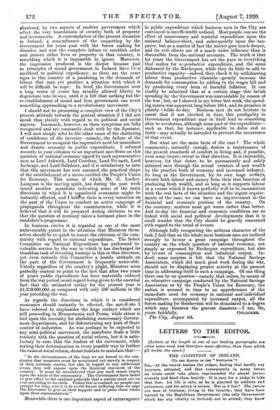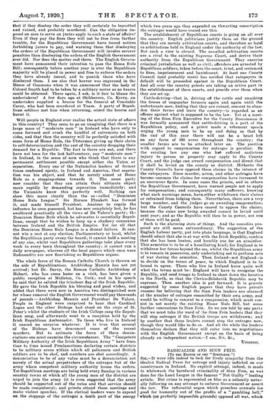LETTERS TO THE EDITOR.
[Letters of the length of one of our leading paragraphs are of ten more read, and therefore more effective, than those which fill treble the space.] -
THE CONDITION OF IRELAND.
(To THE EDITOR OF THE "SPECTATOR."] SIR,--At the recent Assizes the judges, finding that hardly any jurymen attended, and that consequently in many towns no trials could take place, reprimanded the absent jurors severely and fined them heavily. It is easy for a judge to take that line; his life is safe, as he is guarded by soldiers ant policemen, and his salary is secure. But is it fair? The jurors are men of business, living in the locality; they have been warned by the Republican Government (the only Government which has any vitality in Ireland) not to attend; they know
that if they disobey the order they will certainly be boycotted and ruined, and probably murdered. Can the obligation im- posed on men to serve on juries apply to such a state of affairs? Even if they pay the fines they will not be free from further trouble, for the Republican Government have issued notices forbidding jurors to pay, and warning them that disobeying the orders of the Republican Government will involve severer penalties than disobeying the orders of the English Government ever did. Nor does the matter end there. The English Govern- ment have announced their intention to pass the Home Rule Bill; consequently before another year is over the Republican majority will be placed in power and free to enforce the orders they have already issued, and to punish those who have disobeyed them. I see also that horror was expressed in the House of Commons when it was announced that the body of Colonel Smyth had to be taken by a military motor as no hearse could be obtained. There again, I ask, is it fair to blame the undertakers? A few days ago at Skibbereen, Co. Kerry, an undertaker supplied a hearse for the funeral of Constable Carey, who had been murdered at Tuam. A party of Repub- lican soldiers met him when returning, seised the hearse and burnt it.
Will people in England ever realize the actual state of affairs in this country? They seem to go on imagining that there is a large mass of "moderate men" in Ireland who have only to come forward and crush the handful of extremists on both rides, and that then the country will be perfectly satisfied with some form of Home Rule, the Ulstermen giving up their claim to self-determination and the rest of the country dropping their demand for a Republic. The fact is there are not, and there have not been for the last half-century, any "moderate men" in Ireland, in the sense of men who think that there is any permanent settlement possible except either the Union or separation. Every one of the Nationalist leaders of former times confessed openly, in Ireland and America, that separa- tion was his object, and that he merely aimed at Home Rule as a stepping-stone towards it. The same party now consider that they can attain their ultimate object more rapidly by demanding separation immediately; and the Unionists know this perfectly well. Nothing can show this more clearly than the so - called "Dominion Home Rule League." Sir Horace Plunkett has formed it, and made himself President. Anxious to regain the influence he once possessed, but has now completely lost, he has swallowed practically all the views of De Valera's party; ths Dominion Home Rule which he advocates is essentially Repub- lican, except that he wishes to keep up a shadowy connexion between Ireland and the British Empire. Yet for all that the Dominion Home Rule League is a dismal failure. It can- not win a seat at any election, Parliamentary or local, whilst the Republican party sweep the board; it cannot hold a meeting of any size, whilst vast Republican gatherings take place every week in every town throughout the country; it cannot run a daily newspaper, whereas all the local papers which once were Redmondite are now flourishing as Republican organs.
The whole force of the Roman Catholic Church is thrown on the side of Republicanism. Archbishop Mannix has not yet arrived; but Dr. Barry, the Roman Catholic Archbishop of Hobart, who has come home on a visit, has been given a public reception at Midleton, Co. Cork; and in his speech ho eaid that he saluted the tricolour flag of the Irish Republic. He gave the Irish Republic his blessing and good wishes, and added that there were now in America two distinguished men for whose removal the English Government would pay thousands of pounds —Archbishop Mannix and President De Valera. People in England were surprised to hear that Cardinal Logue and the other Bishops had stood on the steps of St. Peter's whilst the students of the Irish College sang the Repub- lican song, and afterwards went to a reception held by the Irish Republican Ambassador. To those who live in Ireland it caused no surprise whatever. It is true that several of the Bishops have denounced come of the recent murders. But to estimate the force of these denun- ciations one must examine the circumstances. The "Competent Military Authority of the Irish Republican Army" have from time to time issued Proclamations declaring certain districts to be military areas within which all policemen and British soldiers are to be shot, and numbers are shot accordingly. A denunciation to be of any value must be a denunciation not merely of the actual perpetrators of the outrages but of the army whose competent military authority issues the orders. Yet Republican meetings are being held every Sunday in various country towns at which all the young men of the district are urged to join the army (it is even suggested that the army should be supported out of the rates and that service should be made compulsory); and priests attend these meetings and make violent speeches. If the clerical leaders were to expend on the stoppage of the outragei S. tenth part of the energy
which two years ago they expended on thwarting conscription the outrages would have ceased ere this.
The establishment of Republican courts is going on all over the country. English Politicians justify them on the ground that they are merely arbitration courts, and therefore as legal as arbitrations held in England under the authority of the law. But such a view is absurd. The so-called arbitration courts are a rival to the existing Supreme Court, and derive 'their authority from the Republican Government. They exercise criminal jurisdiction as well as civil; offenders are arrested by Republican soldiers, taken before the court, tried, and sentenced to fines, imprisonment and banishment. At least one County Council (and probably more) has notified that ratepayers in default will be proceeded against in the Republican Court. And all over the country priests are taking an active part in the establishment of these courts, and preside over them when they are set up.
Cattle-driving—that is, driving off the cattle and smashing the fences of unpopular farmers again and again until the unfortunate men, finding that they are ruined, consent to aban- don their farms and leave the country—is regarded as an offence against what is supposed to be the law. Yet at a meet- ing of the Sinn Fein Executive for the County Roscommon it was formally announced that cattle-driving is a part of the Republican policy, and a priest made a vehement speech urging the young men to be up and doing so that by the end of this year there will not be a beast left on any farm of 500 acres throughout the country; the smaller farms are to be attacked later on. The position with regard to compensation for outrages is peculiar. By the existing law any one who hat suffered malicious injury to person or property may apply to the County Court, and the judge can award compensation and direct that it shall be levied on the county or district. Hitherto the County Councils have opposed these claims in the interest of the ratepayers. Since murder, arson, and other outrages have become common the claims for compensation have increased to an enormous figure. In some cases the priests, and in others the Republican Government, have warned people not to apply for compensation; and consequently many sufferers, knowing what such warnings mean, haveseither withdrawn their claims or refrained from lodging them. Nevertheless, there are a very large number, and the judges go on awarding compensation; but the County Councils have ceased to oppose the claims, because the sums now being awarded cannot be levied until next year; and as the Republic will then be in power, not one of them will be paid.
Such is the alarming state of things. And the remedies pro- posed are still more extraordinary. The suggestion of the English Labour party, put into plain language, is that England should admit that she is at war with the Irish Republic, confers that she has been beaten, and humbly sue for an armistice. This armistice is to beef a humiliating kind; for England is to withdraw her forces beyond the sea, whilst the Republican army is to remain in possession, only undertaking not to perform acts of war during the armistice. Then Ireland—not England—is to decide on the terms of peace, to which England is to be bound to agree. Those who live in Ireland know quite well what the terms must be : England will have to recognize the Republic, and send troops to Ireland to shoot down the heretics in the North, so that the Clerico-Bolshevik Republic may be supreme. Then another idea is put forward. It is gravely suggested by some English papers that they have private reasons for believing that the Sinn Fein leaders are alarmed at the number of outrages committed by their own army, and would be willing to consent to a compromise, which must con- sist in not merely the existing Home Rule Bill, but some further concessions to Sinn Fein. So we are told by one party that we must take the word of :he Sinn Fein leaders that they will stop outrages if the British troops are withdrawn; and by another that those leaders cannot stop the outrages now, though they would like to do so. And all the while the leaders themselves declare that they will enter into no negotiation; with the English Government except on the basis of being already an independent nation.—I am, Sir, &c., 'UNIONIST.



































 Previous page
Previous page